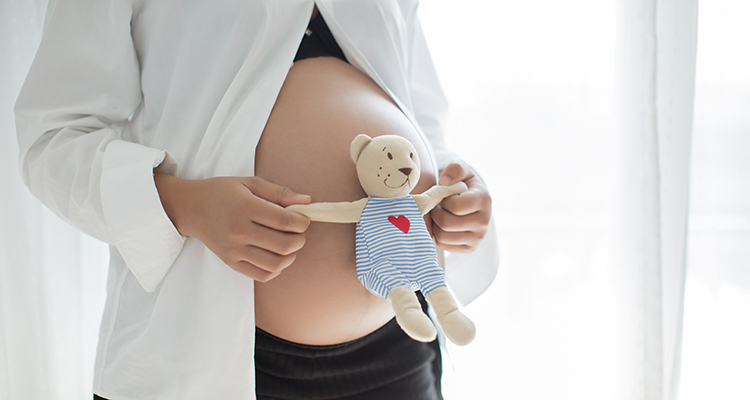Dealing with First, Second, and Third Trimester Insomnia
Pregnancy is an exciting time filled with changes, anticipation, and wonder. It’s also the time in a woman’s life where her body undergoes significant changes — physically, mentally, and emotionally. Over the 40 weeks it takes for your little one to grow and develop inside you, your body will experience countless ups and downs. Those exhilarating moments when you feel the baby kick or hear its heartbeat at the doctor’s office are followed by back pain, weight gain, and mood swings.

Most mothers can agree that the trials and tribulations of pregnancy are well worth it the minute you set eyes on your newborn, getting to delivery day can sometimes be difficult. Parenting a newborn comes with its own set of challenges, including lack of sleep. Unfortunately, for many expecting mothers, sleepless nights start long before your due date. Insomnia can plague women throughout their entire pregnancy for a myriad of reasons. Here, we’ll discuss the causes and symptoms of insomnia during the first, second, and third trimester including, insomnia treatment at home.
Content
Insomnia During Pregnancy
Along with swollen feet, insatiable cravings, and mood swings, insomnia is just one more unpleasant side effect of pregnancy. As many as 80% of women suffer from sleeplessness and sleep disturbances at some point during their pregnancy. Insomnia is described as the inability to fall or stay asleep. So whether you’ve spent hours staring at the ceiling or struggling to find a comfortable sleeping position or have woken up every hour, on the hour, you’ve experienced some form of pregnancy insomnia.

As your body progressively changes over 40 weeks, so do your insomnia triggers and symptoms. Let’s take a closer look at how insomnia presents itself during each trimester and what you can do to get relief.
First-Trimester Insomnia
The first-trimester of pregnancy lasts until the end of the 13th week. It’s before most women start showing a “baby bump” or even tell friends and family that they’re pregnant. Even if no one else knows you’re pregnant, your body does and it lets you know in a variety of ways. While some women experience extreme fatigue during the first three months of their pregnancy, there are other factors at play that make sleeping difficult including frequent urination and morning sickness.

Sleep (or lack thereof) is influenced mostly by a change in hormones — most notably, progesterone. The rise of this hormone causes extreme fatigue, warmth (hot flashes), and a shift in your circadian rhythm. Achieving quality sleep in these first few weeks of pregnancy can be especially frustrating for women who are tired during the day but still find it difficult to fall and stay asleep at night. Nearly 1 in every 10 women suffer from clinical insomnia during their first-trimester, with nearly all women reporting at least minor changes in their sleep patterns.
Morning sickness is another unpleasant side effect that plagues 70% of pregnant women during the first trimester. Even though the name suggests nausea only hits in the morning, many women experience stomach upset all day long, draining their energy levels. Others experience morning sickness at night, causing them to wake frequently and preventing them from getting a quality night’s sleep.
Other physical changes during these three months include tender breasts, increased urination, headaches, bloating, and constipation — all of which can interfere with sleep. Some women may even develop sleep apnea during pregnancy, although this is most common toward the end of your pregnancy.
The Importance of Sleep During the First Trimester
Sleep during the first trimester is extremely important for many reasons. What most people don’t realize is that sleep at this point is more important for you than your baby. Lack of sleep can cause serious health issues in expecting mothers including high blood pressure, gestational diabetes mellitus, depression, and extreme stress. Some studies suggest that sleep apnea and sleep-disordered breathing can also increase the risk of miscarriage.

How to Support Sleep During the First Trimester
Now that you understand the importance of getting quality sleep during the first three months of your pregnancy, let’s discuss tips for getting it done.

Choose the Right Sleeping Position
Discomfort is one of the main reasons pregnant women struggle to get sufficient sleep. During later trimesters, this is because of the increasing size of their belly. During the early stages of pregnancy, other factors are to blame.
Research shows that sleeping on your left side is best for both expecting mothers and the fetus. Side sleeping promotes increased circulation by reducing pressure on the uterus. When you sleep on your back, the additional weight on your internal organs and veins can reduce circulation. By adopting side-sleeping during the first trimester, your body will more easily adjust as your pregnancy progresses.
With that being said, achieving quality sleep during the first trimester is most important, so if side-sleeping isn’t comfortable, it’s okay (at this time) to sleep in whatever position you like.
Use Vitamins and Supplements
It’s a well-known fact that the vitamins and supplements you take during pregnancy are crucial for the health and development of your unborn child. In addition to providing the fetus with nutrients, prenatal vitamins can help prevent RLS (restless leg syndrome). While the cause of RLS is unknown, some studies believe a lack of vitamins could be to blame. By supplementing a healthy diet with proper vitamins and supplements, you can reduce your risk of developing RLS during the first trimester. As tempting as taking sleep aids and other medications are, the first trimester is a delicate stage and this should be avoided.
Stay Hydrated and Well-Fed
Hydration and a balanced diet are important for maintaining overall health and well-being but these are especially important during the first trimester of your pregnancy. Try to drink plenty of water during the day but stop several hours before bed to prevent frequent urination during the night. Pregnant women should also avoid caffeine and heavy, large, or fattening meals before bed. These can increase gastrointestinal issues including nausea and heartburn. Dry toast or crackers can help reduce nausea as well.
Create a Comfortable Sleep Environment
Finding comfort during your first trimester can be difficult but creating a welcoming and accommodating sleep environment can help. Feeling warmer than usual is common during the first few months of your pregnancy so keeping a cool, dark room can help. Room darkening shades and eye covers keep unwanted light out. When you do get up to use the bathroom or stretch your legs, avoid putting on bright lights. Instead, opt for a small night light to guide your way. Adding a white noise sound machine or using earplugs can help reduce external noises and disturbances. A comfortable mattress and lightweight sheets can also increase airflow and help you find a more comfortable sleep position.
Practice Good Sleep Hygiene
Sleep hygiene involves performing behaviors both during the day and at night that promote good sleep. Getting physical activity is important and recommended throughout your pregnancy unless your doctor restricts exercise. Physical activity can help you maintain a healthy weight and feel tired enough to sleep at night. Try going to sleep around the same time each night and waking at the same time in the morning. This helps balance your circadian rhythm.
Why Sleep Improves During the Second-Trimester
The second trimester of your pregnancy lasts from the end of week 13 until week 26. During this time, most women undergo significant physical changes. While morning sickness and nausea start to fade away, your baby bump is most likely growing. During this time, some women experience small improvements in sleep quality thanks to stabilizing hormone levels and other changes. As the fetus grows, your uterus shifts further away from the bladder, reducing the number of bathroom trips you take. Even as your baby grows, it isn’t big enough during the second trimester to significantly impair your sleep.

The average woman gets between 7 and 8 hours of sleep during these few months. This is more than you’ll likely get during the first or third trimester and definitely more than you’ll get during the first few months of your newborn’s life. That’s why it’s important you take advantage of second-trimester sleep. Conserve energy whenever possible — you’ll need it! Lack of sleep during this time can also cause health complications including increased stress and depression, gestational diabetes, preeclampsia, risk of preterm delivery, and reduced quality of life.
Understanding Second-Trimester Insomnia
While your sleep quality should improve during your second trimester, you may face new changes and challenges.

Leg cramps and the risk of RLS increase during the second trimester. You may also notice your feet begin to swell. Increased weight gain and loose ligaments can trigger lower back pain. Many women report vivid and unsettling dreams during their second trimester, causing them to wake frequently, with some feeling increased stress. Your circadian rhythm continues to fluctuate, resulting in you falling asleep and waking earlier than normal. Headaches are another common complaint during the second trimester and come in the form of both migraines and tension headaches.
As the baby and your stomach continue to grow, some women experience increased congestion. This can lead to snoring, as well as obstructive sleep apnea. While nausea subsides, new gastrointestinal issues present themselves including heartburn and constipation. These get increasingly worse as you enter the third trimester.
It’s during week 20 that most women feel their baby move for the first time. While this is an exciting moment for many, it can also trigger feelings of anxiety and panic. For some women, it isn’t until they feel their baby moving that the reality of motherhood hits them. This realization can cause stress, anxiety, and depression in some women, which are some of the most common causes of insomnia.
Supporting Sleep During the Second-Trimester
Even though you may find some relief and more sleep during the second trimester, it still won’t be perfect. Here are a few ways to ensure you get as much quality sleep as possible from weeks 13 to 26 of your pregnancy.

Best Sleeping Positions
Similar to the first trimester, you should continue sleeping on your left side during this trimester if possible. This will allow healthy circulation to your kidneys and fetus. Try propping up pillows or sleeping in a reclined position to promote blood flow. If you’re a stomach sleeper, you can continue sleeping this way until your baby bump starts getting in the way. After week 16, avoid sleeping on your back. Doing so places unwanted pressure on the uterus as well as the inferior vena cava vein which may restrict blood flow to your lower extremities, increasing swelling in your legs, feet, and ankles.
When laying on your back, place a pillow behind yourself to prevent rolling over in your sleep. You can also purchase a wedge or pregnancy pillow to help you find a more comfortable sleep position. Some pregnant women benefit from a pillow between their knees to improve spine and hip alignment.
Practice Proper Sleep Hygiene
Proper sleep hygiene is still important during your second trimester. Continue adopting a productive sleep environment, keeping your bedroom dark, cool, and peaceful. If you can’t fall asleep after 15 to 20 minutes try getting up and performing relaxing behaviors that promote sleep. Lying in bed awake for too long confuses your brain and body into thinking you should be awake in bed. Continue going to sleep and waking up around the same time each day to create a healthy sleep-wake cycle.
Relaxing bedtime behaviors include meditating, stretching, reading a book, listening to music, or taking a soothing bath. Avoid using digital devices including smartphones, laptops, and televisions too close to bedtime. The blue light from these devices prevents your brain from releasing the sleep hormone melatonin. Prenatal massage also promotes sleep and helps relax your body and mind for sleep.
Hydrate, Eat Right and Exercise
You’ll notice that several of these recommendations for getting quality sleep during your second-trimester mirror what was mentioned at the start of your pregnancy. You should continue to hydrate regularly. The second trimester brings a welcome break from frequent bathroom trips as you won’t experience the same intense bladder pressure.
Your diet should consist of foods high in protein, vitamins, and nutrients. Avoid caffeine, spicy foods, or eating large meals that might aggravate your heartburn and other gastrointestinal issues. Sleeping in a reclined position helps with both circulation and reducing acid reflux. A healthy diet should always be paired with adequate exercise. Continue daily physical activity as long as your doctor permits. You’ll have newfound energy in your second trimester which will support an active lifestyle. Exercise wards off feelings of depression which are common during pregnancy. It will also leave you tired and ready for a good night’s sleep at the end of the day. Practice core-strengthening exercises which will reduce leg and back pain while also promoting easier labor on delivery day.
If daytime fatigue gets the best of you during this trimester, allow yourself a short nap early in the day. This will help reenergize you without interfering with your nightly sleep.
Invest in Your Mental Health
Mental health during pregnancy is always a concern and requires your attention. This is especially true during the second trimester when the reality of motherhood finally sets in. Your hormones are continuing to fluctuate and your body is increasingly changing. All of these dramatic differences can be overwhelming for new and expecting moms. By investing in your mental health, you’re also promoting quality sleep and preparing your body and mind for what’s to come.
Talk to family, friends, and loved ones about how you’re feeling. Their love and support can help you navigate these major life changes and the stress and anxiety that come with them. If you find yourself lying awake at night with racing thoughts and worry over getting everything done, make a to-do list and get proactive about ticking things off your list. At the same time, avoid putting too much pressure on yourself, and don’t be afraid to ask for help. Adopt stress-reducing activities like meditation, mindfulness, deep breathing techniques, and guided imagery. Prenatal yoga can help teach you these methods while also improving flexibility and reducing aches and pains. You may even make friends with other expecting moms that can offer additional advice and support. When you lower your stress levels, you’ll also improve your sleep quality.
Navigating Third Trimester Insomnia
Congratulations! You’ve made it to the third trimester of your pregnancy. Even though you’re in the homestretch, your sleep troubles may not be over. This last trimester which lasts from week 27 until you give birth around week 40 comes with its own unique set of sleep challenges and tribulations.

Your belly is growing to max capacity at this point, placing pressure on your back, legs, feet, and joints. You may also notice more muscle and joint pain than before. While you’ll experience some of the same ailments you did in the previous two trimesters, for some women, this last stage of pregnancy is the most difficult.
Insomnia Triggers in the Third Trimester
In addition to a growing belly and anticipation over your new arrival, the third trimester can interrupt your sleep in numerous ways. Here are a few things to consider and expect during this time.

General Discomfort
Most women experience general discomfort in the third trimester including back pain, swelling, and sore muscles. One of the main causes of insomnia during this stage of the pregnancy is back pain and being unable to find a comfortable sleeping position. Approximately 2 in 3 women report having extreme lower back pain and muscle aches. Women who are also battling depression or anxiety are more likely to report back pain. This is probably due to lower pain tolerance.
Other discomforts that can trigger insomnia in the third trimester include fetal kicking, overactive kidneys, and joint pain. During your third trimester, you’re also at greater risk for developing leg cramps and RLS. An estimated 1 in 3 women suffers from restless leg syndrome in the third trimester. This condition is characterized by a tingling in your legs and an overwhelming urge to move them. This discomfort is worse when your body is at rest, making it difficult to fall asleep.
Increased Anxiety and Depression
The third trimester can bring on a surge of unpleasant feelings including increased stress, anxiety, and depression. Negative thoughts manifest themselves in nightmares, racing thoughts, increased stress, and the inability to sleep. Some soon-to-be mothers worry over not being prepared, which can cause extreme stress and panic attacks. Your nerves might also increase as your due date gets closer, making it difficult to relax enough to sleep.
Sleep Apnea
Women in the third trimester are at an increased risk of developing sleep apnea and suffer from chronic snoring. While snoring may just seem like a nuisance, it could be a sign of something more serious including high blood pressure and preeclampsia. Those diagnosed with sleep apnea are also at an increased risk of maternal morbidity and gestational diabetes.
Gastrointestinal Issues
Your digestive system slows down as you near the end of your pregnancy, which means you’ll need to eat smaller meals more frequently. You may also notice an increase in heartburn, acid reflux, and constipation. Sleeping in an elevated position can reduce this discomfort and make it easier to sleep at night. Avoid large or heavy meals and spicy foods too close to bedtime to prevent an acid reflux flare-up.
Why Sleep is Important in the Third Trimester
In just three short months, you’ll be a new mom! Now is the time to rest, recharge, and prepare for motherhood. Getting adequate sleep during this last stage of pregnancy is important for many reasons.

Lack of sleep in the third trimester increases your risk of preterm birth and preeclampsia. Habitual snoring may result in giving birth to a baby that is too small or too big, based on weight. Women with insomnia in the later stages of pregnancy tend to have longer, more intense labors and are at greater risk of needing a cesarean section. Similar to the previous trimesters, lack of sleep in weeks 27 to 40 could cause gestational diabetes mellitus. The better quality sleep you get during the third trimester, the more successful you may be at breastfeeding and warding off postpartum depression.
Promoting Quality Sleep in the Third Trimester
Before you welcome your newborn, it’s important you get adequate sleep. Here are a few ways to support healthy sleep habits toward the end of your pregnancy.

Sleep on Your Side
Your sleep position is more important than ever during the third trimester as your belly continues to grow and finding a comfortable sleep position becomes increasingly difficult. Even if you were sleeping on your back earlier in your pregnancy, it’s time to move to your left side. Try tucking your knees toward your chin in this position to improve blood flow. This benefits the baby by providing adequate circulation, oxygen, and nutrients and helps prevent hemorrhoids, swelling, and varicose veins in expecting mothers. Use a sleep or pregnancy pillow to help find and stay in the ideal sleep position.
Additional Sleep Hygiene Tips
We already covered several techniques for promoting good sleep hygiene in the first two trimesters and you should continue those in your third trimester, plus add a few new ones. Continue stress reducing activities like prenatal yoga, stretching, and meditating. By now, you should know which foods trigger stomach upset and heartburn so continue to avoid these foods and eat small, light meals before bed.
Your growing uterus may cause difficulty breathing, snoring, and sleep apnea as well. Sleep with a few extra pillows to keep your head elevated and airways clear. Keep engaging in daily physical activity to promote a healthy weight, flexibility, strength, and induce sleep. When it is time to head to bed, create a welcoming environment free of light, noise, and other interruptions.
Use Natural Sleep Aids
It’s not recommended that pregnant women use sleep aids or medications, especially during the third trimester. Instead of reaching for the medicine cabinet, try utilizing natural sleep aids like lavender and chamomile. Both of these herbs come in oil form which you can easily add to your tea or an essential oil diffuser. Place a few drops of oil on your skin or pillows at night. The aroma will help relax you, ease your anxieties, and help you fall asleep faster.
Achieving Quality Sleep During Pregnancy is Essential
Pregnancy is a beautiful, emotional, and exhausting experience. Your body and mind will undergo numerous changes with each passing week. Knowing what to expect during your first, second, and third trimester can help you prevent insomnia and promote quality sleep. Getting adequate sleep supports not only your health and mental well-being but the health and development of your unborn child.

In addition to these tips for achieving quality sleep and preventing insomnia symptoms, you can utilize online therapy and treatment programs. Convenient online programs like Somnus Therapy let you follow along at your leisure and from the comfort of your own home, making them perfect for busy expecting mothers.




















